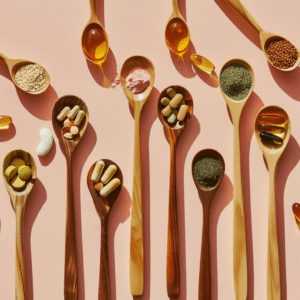
If you’ve ever walked down the best supplements recommended and felt overwhelmed by the number of bottles staring back at you, you’re not alone. With so many options, knowing which supplements are worth it is hard. Thankfully, dietitians are here to help! These experts understand what your body needs and can point you toward the best supplements for optimal health. In this guide, we’ll simplify things and review the top supplements recommended by dietitians so you can feel confident in your actions.
1. Multivitamins: Your Daily Nutrient Safety Net
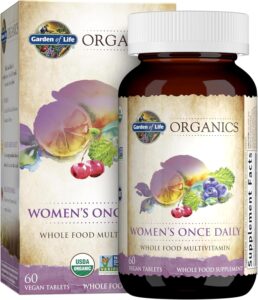
Let’s start with multivitamins, which are like a one-stop shop for essential nutrients. If your diet isn’t always as balanced as it could be, or you’re too busy to track every vitamin and mineral, a multivitamin can fill in the gaps. It’s a simple way to ensure you get vitamins A, C, D, and essential B vitamins.
When should you consider taking one? A multivitamin might be a good idea if you need to eat various fruits, veggies, and whole grains daily or follow a restrictive diet. It helps people who are older, pregnant, or have certain health problems. But remember that this is just a backup plan. Real things are always better!
2. Omega-3 fatty acids help keep your heart and mind healthy.
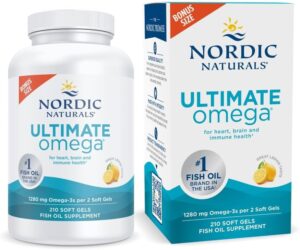
BUY NOW
$60.48
You’ve probably heard about the wonders of Omega-3 fatty acids for heart health, but they do so much more! Omega-3s, found in fish oil, reduce inflammation, support brain function, and even ease joint pain. If you’re not getting enough from fatty fish like salmon or mackerel, an Omega-3 supplement can help. Research shows that the essential fatty acids EPA & DHA in fish oil support heart, brain, eye & immune health. Omega-3s may also help support a healthy mood.
How much should you take?
Most dietitians suggest around 250-500 mg of combined EPA and DHA (the critical types of Omega-3s) daily. This is one of the most essential supplements for those who don’t eat fish regularly. Be sure to choose a quality supplement that provides both EPA and DHA for maximum benefits.
3. Vitamin D: The Sunshine Vitamin You’re Probably Missing
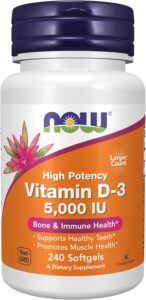
BUY NOW
$11.99
Even though your body can make Vitamin D from sunlight, many people don’t get enough—especially during winter or if we spend most of our time indoors. To keep your bones strong, your immune system healthy, and mood. A supplement can be a lifesaver if you’re not soaking up enough rays. Supports healthy immune system function and is essential for achieving and maintaining optimal bone mineral density. Highly-absorbable liquid softgel form of vitamin D-3.
Why might you need it?
You could be deficient if you live in a place with long winters, have darker skin, or spend little time outside. The general recommendation is around 600-800 IU daily, but some people may need more. Always check your levels with a healthcare provider to be sure!
4. Probiotics: For a Happy Gut
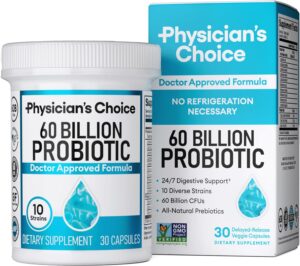
BUY NOW
$21.57
Gut health is all the rage these days and for good reason. Probiotics are the “good” bacteria that keep your digestive system running smoothly. They can help with everything from bloating to boosting your immune system. Probiotics are worth considering whether you’ve taken antibiotics recently (which can mess with your gut flora) or feel like your digestion could use a little help. Max Strength General Purpose Probiotic: Our non-refrigerated probiotic is designed to support digestive health & gut health. A great choice for those looking to support a diverse healthy microbiome w/ 60B CFU – Probiotics for Women & Men alike.
Which probiotic is right for you?
Different strains of probiotics do other things, so it’s essential to pick the right one. Look for a supplement with multiple strains and at least 10-20 billion CFUs. Refrigerated options tend to be more potent, which is a good sign of a high-quality product.
5. Magnesium: For Relaxation and Muscle Health
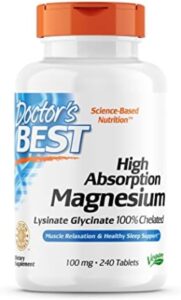
BUY NOW
$17.28
Some minerals don’t get as much attention as they should, but magnesium is very important. It helps your muscles relax, your nerves work better, and it even helps you sleep better. Plus, it can help with those awful muscle cramps! If you don’t eat a lot of nuts, whole grains, and fresh greens, you may need to get more magnesium from the food you eat. Doctor’s Best High Absorption Magnesium supports bone density & muscle relaxation, promotes healthy sleep, helps maintain a normal, regular heartbeat and improves overall cardiovascular health. Our products are made with TRAACS, The Real Amino Acid Chelate System, a patented form of bioavailable magnesium that is chelated to optimize bioavailability. Chelated magnesium ensures easier and faster absorption.
Signs you might need more magnesium:
If you struggle with sleep, feel fatigued, or experience frequent muscle cramps, magnesium could be the missing piece. Magnesium citrate and glycinate are great options for supplements, as they’re easier for your body to absorb.
6. Calcium: For Strong Bones and Teeth
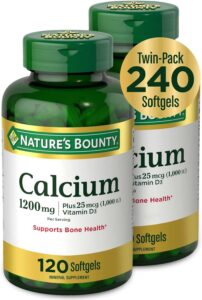
BUY NOW
$17.05
You need calcium to keep your bones healthy, but did you know it also helps with muscle function and nerve signaling? Many people, especially women, don’t get enough calcium through diet alone, which can lead to bone loss over time. A calcium supplement might be necessary if you don’t eat a lot of dairy or fortified foods. Nature’s Bounty Calcium Plus Vitamin D3 has 1200 mg of calcium, the primary mineral which helps maintain bone strength and helps support neuromuscular health (1).
How to make the most of calcium supplements:
Calcium is one of the best supplements recommended which come in two primary forms: calcium carbonate and calcium citrate. Calcium citrate is better for your stomach and absorbs better, especially for older adults. For better absorption, take your supplement in smaller doses (around 500 mg) at a time, and make sure you’re getting enough Vitamin D to help your body use that calcium.
7. B Vitamins: Energy and Brain Boosters
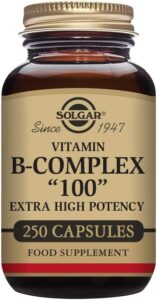
BUY NOW
$38.25
Are you feeling tired all the time? You might be low on B vitamins. These vitamins help turn food into energy and are vital for brain function. People who are vegan, vegetarian, or older are more likely to get sick for a B12 deficiency since it’s mainly found in animal products. Supports Cardiovascular & Nervous System Health; Just one capsule a day with a meal helps provide the recommended doses of Vitamin B1, B2, B3 and B6, all of which support a healthy heart and nervous system health.
Should you take a B-complex supplement?
If you need help determining which B vitamin you need, a B-complex supplement is a good catch-all, covering all eight essential B vitamins. B12 is often the show’s star for energy and brain health, but the whole family works together to keep you sharp and energized.
8. Iron: For Energy and Blood Health
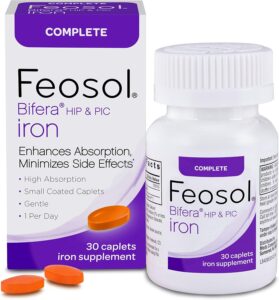
BUY NOW
$15.96
Iron is needed to make hemoglobin, which moves oxygen around the body in your blood. Low iron levels can lead to anemia, making you feel tired, dizzy, and generally run down. Women, in particular, are more prone to iron deficiency due to menstruation, so it’s something to watch out for.
How do you know if you need iron?
If you’re feeling sluggish and your doctor told you your iron levels are low, an iron supplement can help. However, be careful—too much iron can cause digestive issues. Ferrous sulfate is the most common form, but if it bothers your stomach, look for a gentler option like ferrous bis-glycinate.
9. Collagen: For Skin, Hair, and Joint Health
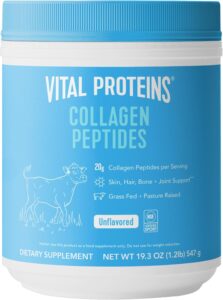
BUY NOW
$34.73
Collagen gives skin suppleness and strengthens joints. I production slows down with age, which leads to lines, joint discomfort, and muscular weakness. Collagen supplements can smooth skin and flex joints.
Which Type of collagen should you choose?
There are different types of collagen, with Type I being great for skin and bones and Type II being best for joint health. The form that is most easily taken is collagen peptides and it’s always a good idea to pair them with Vitamin C to boost collagen production in your body.
10. Zinc: Immune System Booster
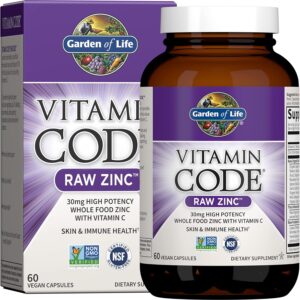
BUY NOW
$10.63
Zinc is one of those minerals that only gets a little attention once you’re feeling under the weather. It’s an important part of how defenses work and helps your body heal wounds. Zinc is also known for shortening the duration of colds, which is why many people turn to it during flu season.
How much zinc do you need?
Dietitians usually recommend around 8-11 mg per day for adults. If you’re vegetarian, pregnant, or dealing with gut issues, you might be at higher risk of deficiency. Zinc gluconate and citrate are good supplement options, but be careful not to overdo it—too much zinc can interfere with copper absorption.
Conclusion
Though they should not be a substitute for a balanced diet, best supplements advised can be a terrific method to support your health and cover nutritional shortages. Whole foods are the finest source of most nutrients since they provide a safety net for should your diet fail. See a nutritionist or healthcare expert to be sure you are using the correct supplements for your particular requirement before beginning any new one. This guide will help you to clearly identify the best supplements advised by dietitians, thereby enabling you to select what suits you most.
Your body will thank you!





